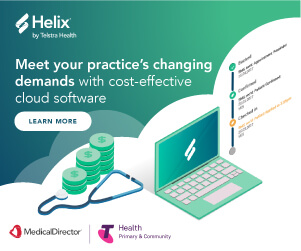Report reveals digital will enable better health outcomes
The recent CSIRO Future of Health report has revealed a number of key concerns about the state of health in Australia, with technology highlighted as a critical enabler for improving health outcomes.
Developed by CSIRO Futures, the strategic advisory arm of CSIRO, the The Future of Health report examined over 30 organisations across the health sector including government, health insurers, educators, researchers, and professional bodies.
Key findings include:
- Australians spend on average 11 years in ill health – the highest among OECD countries.
- 63 per cent (over 11 million) of adult Australians are considered overweight or obese.
- There is a 10-year life expectancy gap between the health of non-Indigenous Australians and Aboriginal and Torres Strait Islander peoples.
- 60 per cent of the adult population have low levels of health literacy.
- The majority of Australians do not consume the recommended number of serves from any of the five food groups.
“As pressure on our healthcare system increases, costs escalate, and healthy choices compete with busier lives, a new approach is needed to ensure the health and wellbeing of Australians,” CSIRO Director of Health & Biosecurity Dr Rob Grenfell said.
Key challenges facing healthcare
The report revealed a number of key challenges facing Australia’s healthcare that will impact the future, including:
- The changing national health profile and an ageing population
- Inequity in access and experience
- Unsustainable financing
The report also stated that the cost of managing mental health related illness to be $60 billion annually, with a further $5 billion being spent on managing costs associated with obesity.
Health inequities across a range of social, economic, and cultural measures were found to cost Australia almost $230 billion a year.
“Unless we shift our approach to healthcare, a rising population and increases in chronic illnesses such as obesity and mental illness, will add further strain to the system,” Dr Grenfell said. “By shifting to a system focused on proactive health management and prevention, we have an exciting opportunity to provide quality healthcare that leaves no-one behind.
“How Australia navigates this shift over the next 15 years will significantly impact the health of the population and the success of Australian healthcare organisations both domestically and abroad.”
The changing digital landscape
Interestingly, the report reveals the challenges facing Australian healthcare as we move into a more digitally enabled ecosystem:
- Consumer behaviour and trust: Consumers are demanding more from their healthcare experiences and embracing new technology for low-risk decision making relating to their health.
- Adjusting to an increasingly digital world: Trust in data sharing, digital and health literacy, data ownership, system interoperability, and Australia’s current digital infrastructure present as key barriers to a more integrated and data-enabled health system.
- Fragmented and inflexible health systems: Barriers to an integrated health services model include multiple and complex funding arrangements, siloed data streams, ever‑evolving regulatory requirements, and dated infrastructure.
Shifting the system from treatment to prevention
According to the report, the health industry needs to shift its focus from treatment to prevention. The report stated the benefits of this re-shift include:
- Improved health outcomes and equity for all Australians.
- Greater system efficiencies that flatten the cost curve of health financing.
- More impactful and profitable business models.
- Creation of new industries based on precision and preventative health.
- More sustainable and environmentally friendly healthcare practices.
- More productive workers leading to increased job satisfaction and improved work-life balance.
Technology as enabling better heath outcomes
As part of its key recommendations, the report revealed how digital technologies could assist many of the necessary changes, complementing the role of health professionals and providing consumers with greater autonomy in their health and wellbeing management.
Importantly, it highlighted that the health sector will need to consider:
- How to facilitate greater uptake of novel and effective health solutions
- How to provide health professionals and organisations with the necessary support required to successfully navigate change
- Examining all the system changes required to securely unlock value from the growing volume of personal health information being generated
- How to uncover opportunities for divesting away from obsolete or lower value health solutions.
Interestingly, the report recommended the industry to refocus on the future of a digitally enabled healthcare ecosystem in order to empower customer, address health inequity, unlock the value of digitised data, better supporting integrated solutions and precision health solutions, as well as integrating more effectively with the wider global sector.









